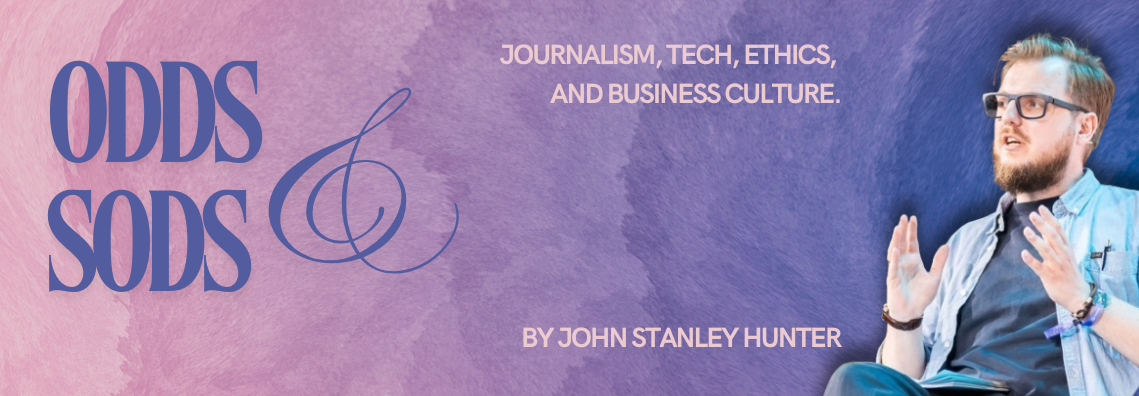Owning the Words & “Effortless” Is the Devil’s Bargain

As “Odds & Sods” grows, I thought it wise to switch the newsletter to its own website—more control, less dependence on the whims of platform landlords. The migration, predictably, has proven complicated. The result? This edition appears a day late; apparently, independence comes with its own technical delays.
Speaking of platforms: some of my favourite newsletters still call Substack home. I’d rather avoid it, not from petulance but principle—their unwillingness to moderate actual Nazi content is no minor infraction. In July, Substack sent out a push alert recommending a Nazi blog. Not hyperbole: the logo was a swastika, with all the historical weight that entails.
To my favourites: Grace Blakely, Max Read, Taylor Lorenz, Anne-Kathrin Gerstlauer, and the Gegenpressing team—if the mood ever strikes to move elsewhere, I’ll gladly resubscribe. It’s no vendetta; I prefer not to see my subscription fees funnelled to a company that equates neutrality with amplifying fascism. If bias means refusing a platform to swastikas, I’ll take bias, thank you very much.
As for my own attempts at independence: so far, this newsletter’s been published through Beehiiv (at least, not Substack). But going forward, I want even firmer grip on the machinery—ownership of the site, the content, the means of distribution. So, going forward, my website and newsletter will be built with the open-source Ghost software.
By now, readers will know my immense distrust of the American social-media giants. What we publish there is merely loaned, at extortionate rates, to platforms that monetise it by means both overt and insidious. We don’t own the keys, and we most certainly don’t own the lock. Our words become ad fodder, engagement fuel, or—most sinister—a data trove for the AI treadmill I so often critique.
Is this what passes for intellectual property in our digital age? If so, it’s a charade. Own your words—or watch them ventriloquised by an algorithm and sanitised by a boardroom you’ll never see. Demand more from your platforms. Or, better yet, build your own.
Effortless by Design, Mediocre by Result
For months now, I’ve been grappling with explaining my growing caution toward the latest waves of technology. This might surprise anyone who knows me well—my reputation as “always online” precedes me, and my right hand is more often wrapped around my phone than anything else. It’s practically the defining detail in my school yearbook from 2009. I spent years comfortably believing that more connectivity, gadgets, and features meant progress, plain and simple. But lately, I’ve begun to question that assumption, which marks a significant shift from my long-held views.
Much of our discourse presents “progress”—and yes, I do mean to put that word in quotes—as an unquestioned good. The implication is that every new device, every tool powered by artificial intelligence, is an unalloyed benefit to society. I find myself increasingly sceptical. I’m aware that this might sound like the lament of an ageing contrarian yelling at clouds, but so be it; perhaps there’s wisdom in a bit of resistance, especially when the prophets of Silicon Valley want unquestioning converts.
What really troubles me is the sheer certainty with which we’re told that universal access to large language models, smartwatches, and constant digital connection is the mark of a better life. Is it? Individually, some of these tools genuinely help; collectively, their impact is more muddled—often making us more distracted, less deliberate, sometimes even eroding the bonds that connect us in the first place. More technology doesn’t always mean more humanity.
I keep returning to this thought-feeling. So while I’m still in the process of finding the exact words, while I wrestle with the correct language and format, I’ve been thinking about a video from JA Westenberg, who argues that “effortless” is the biggest scam the tech industry ever sold us. Every company pushes the idea that our lives should require less work, less thought, less energy. But where does that lead? “Manual Mode,” as Westenberg calls it, is about choosing effort: doing the work, thinking harder, creating more. It’s a reminder that progress isn’t simply what someone else defines; it’s about whether what’s new enriches us.
Move Fast & Break Society
I will give you another piece to consider regarding the questioning of technological progress:
As many of us people who study or work in tech tried to tell y’all, move fast & break things was always about POWER, not progress.
— Mar Hicks (@histoftech.bsky.social) 2025-06-05T09:44:52.942Z
Mar Hicks argues, in one sentence published on Bluesky, that the phrase “move fast & break things,” famously promoted by Mark Zuckerberg as a guiding principle for Facebook and much of Silicon Valley, was never truly about improving the world or driving “progress.” Instead, it focused on tech companies gaining power—over markets, users, laws, and communities—by acting quickly and disregarding potential harm.
While the phrase may sound like a call for innovation, it actually allowed companies to bypass regulations, disrupt entire industries, and damage social norms, all in the name of growth and dominance. It granted companies the freedom to do whatever was necessary to become bigger and stronger, without seeking permission or considering the consequences for others. Thus, the real objective was not progress, but rather winning—getting ahead and establishing control—even if it meant creating problems that others would have to address later.
As always, thank you for reading.


